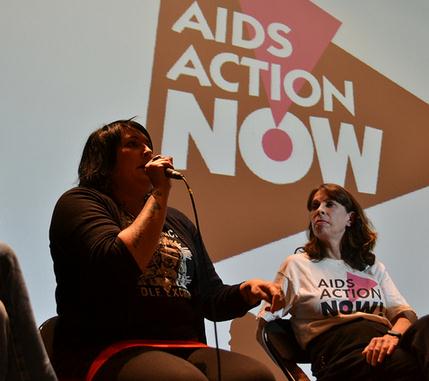
AIDS Action Now's Zoë Dodd says all Canadians should be outraged that Bill-C-398 was defeated. Credit: Andrea Houston
HIV/AIDS activists are reacting with outrage following news that a bill that would have helped get lifesaving medicines to millions of people in the developing world was defeated in the House of Commons Nov 28 by seven votes.
Bill C-398, a private member’s bill introduced by New Democrat Hélène Laverdière, would have reformed Canada’s Access to Medicines Regime (CAMR) – a law passed in 2004 — to make it easier to get Canadian generic medicines to developing countries.
News of the bill’s defeat broke as AIDS Action Now (AAN) kicked off its new poster campaign at the Art Gallery of Ontario. AAN’s Alex McClelland says Prime Minister Stephen Harper once again chose profits over people.
“The Conservative government is in bed with pharmaceutical companies, and they want to make sure they keep making big bucks, so they actively countered this bill because they do not want the production of generic medications to help save the lives of people in other countries that need them,” McClelland says.
Only seven Conservative MPs supported the private member’s bill, which was defeated in a narrow vote: 141 for and 148 against.
It’s unclear whether MPs were allowed a free vote. A list of those who voted against the bill can be found here. The list includes Health Minister Leona Aglukkaq, Foreign Affairs Minister John Baird and Prime Minister Harper. Liberal MP Justin Trudeau was not present for the vote.
Richard Elliott, executive director of the Canadian HIV/AIDS Legal Network, was in Ottawa for the vote. He says the bill would have cost taxpayers nothing and would have significantly helped the world’s poorest people.
Elliott says the bill should have been a “no-brainer.” Unfortunately, many Conservative MPs repeated several lies about the bill in the hours leading up to the vote, he says.
“The problem is the current government,” he says. “They have opposed these reforms tooth and nail. [Conservative] MPs keep saying things that are incorrect about the bill. So many of them don’t do their homework and just swallow the party line.”
Right now, the fight against HIV/AIDS and other infectious diseases that affect millions of adults and children in the developing world depends on costly patent drugs made by big pharmaceutical companies in the West. A drug’s patent lasts for 20 years.
Generic manufacturers can pay a royalty to the patent holder and make a cheaper version available only after that expiry period.
Most of the latest drugs that combat HIV/AIDS are still within that 20-year limit, which puts them out of reach of most of the world’s poor. Bill C-398 would have made it possible for generic manufacturers to produce lower-cost versions of drugs that are still under patent protection as long as they were destined for the neediest countries, as designated by the World Trade Organization (WTO).
There are about 23.5 million people living with HIV in sub-Saharan Africa, according to amfAR, the American Foundation for AIDS research. Every day nearly 7,000 people in the world contract HIV — that’s 300 every hour.
“Most developing countries simply can’t afford to pay the price demanded by brand-name companies on patented drugs,” Elliott says. “This would have fixed the current law.”
Laverdière, who was not available for comment, released a statement noting that the bill had the support of more than 80 international organizations, 250 Canadian civil society organizations, faith leaders and about 80 percent of Canadians, many of whom brought petitions and wrote letters to MPs urging them to support the bill.
“By voting against this bill, the Conservatives refused to put partisanship aside for the sake of saving lives,” she states.
AAN’s Tim McCaskell called the bill’s defeat “incomprehensible and appalling.”
“Why would the Canadian Parliament want to deny people access to medicines? You can see the fingerprint of big pharma and big money all over this,” he says. “People are more concerned with protecting their patents than they are with saving lives.
“Our government is criminalizing people in Canada and denying drugs to people in Africa . . . Those MPs are complicit in genocide.”
Zoë Dodd, also with AAN, says all Canadians should be furious about this. “Those who voted against it have blood on their hands,” she says.
McClelland says Bill C-398 was also likely the last chance for such reforms. Laverdière’s bill mirrored a similar bill from the previous Parliament that passed the House of Commons in March 2011 with support from the entire NDP caucus, a majority of the Bloc Québécois, and some Liberals and Conservatives.
The bill died in the Senate a few weeks later when the government was defeated and the country was thrust into an election.
“This is what we have come to expect from this government. As someone living with HIV, I get increasingly depressed to see medical apartheid play out this way. It’s horrifying. We feel helpless,” McClelland says.

 Why you can trust Xtra
Why you can trust Xtra


